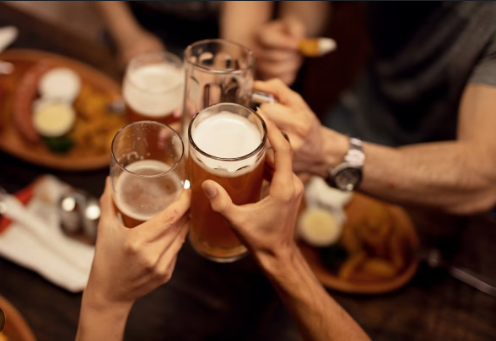Here are some effects of sipping alcohol before meals
![Here are some sweet benefits of sipping alcohol before meals [The Independent]](https://ocdn.eu/pulscms/MDA_/2d808a54816ed85363dcc28dd247a26a.png)
Consuming a small amount of alcohol before a meal is a common practice in many cultures, often seen as a way to enhance the dining experience.
This tradition is rooted in the belief that a pre-meal drink can stimulate appetite, improve digestion, and make the meal more enjoyable. However, while there are some potential benefits, there are also various effects that alcohol can have on your body and digestive system.
Understanding these impacts can help you make informed decisions about whether to include alcohol as part of your pre-meal routine. Here are some of the primary effects of drinking a little alcohol before eating:
1. Stimulates appetite
Alcohol, particularly in moderate amounts, can stimulate appetite. This is why aperitifs, alcoholic drinks served before a meal, are popular in many cultures.
Alcohol increases the production of stomach acids and digestive enzymes, which can make you feel hungrier and enhance your appetite.
![Stimulates appetite [DailyMail]](https://ocdn.eu/pulscms/MDA_/427ce8ca19b55c692b221bbce4008f34.jpg)
2. Makes food taste better
Drinking a little alcohol before eating can enhance your taste perception. Alcohol stimulates the taste buds and increases saliva production, making the flavours of your food more pronounced and enjoyable.
3. Relaxation and social benefits
A small amount of alcohol can help you relax, which can make the dining experience more enjoyable. It may also reduce social anxiety, making it easier to engage in conversation and enjoy the company of others.
4. Potential for increased caloric intake
While alcohol might stimulate appetite, it can also lead to consuming more calories than intended. Alcohol itself is calorically dense, and feeling hungrier can result in eating larger portions or opting for richer, more calorific foods.
![Potential for increased caloric intake[Instagram/opeyemifamakin]](https://ocdn.eu/pulscms/MDA_/9c713c051bc6f01ef14dc243b03f2522.jpg)
5. Impact on blood sugar levels
Alcohol can affect blood sugar levels, which is particularly important for individuals with diabetes or those monitoring their blood sugar. Drinking before eating can cause an initial spike in blood sugar, followed by a potential drop, especially if the meal is delayed.
6. Inhibition of fat oxidation
Alcohol can temporarily inhibit the body’s ability to burn fat. When you consume alcohol, the body prioritises metabolising it over other nutrients, which can slow down the fat-burning process. This can be a consideration for those mindful of their weight or metabolic health and good news for those trying to gain some weight.
Drinking a little alcohol before eating can have both positive and negative effects. While it can stimulate appetite, enhance flavour perception, and provide relaxation benefits, it also has the potential to increase caloric intake, affect blood sugar levels, inhibit fat oxidation, and impair judgment.
Being mindful of these effects can help you make informed decisions about whether to include alcohol as part of your pre-meal routine.

